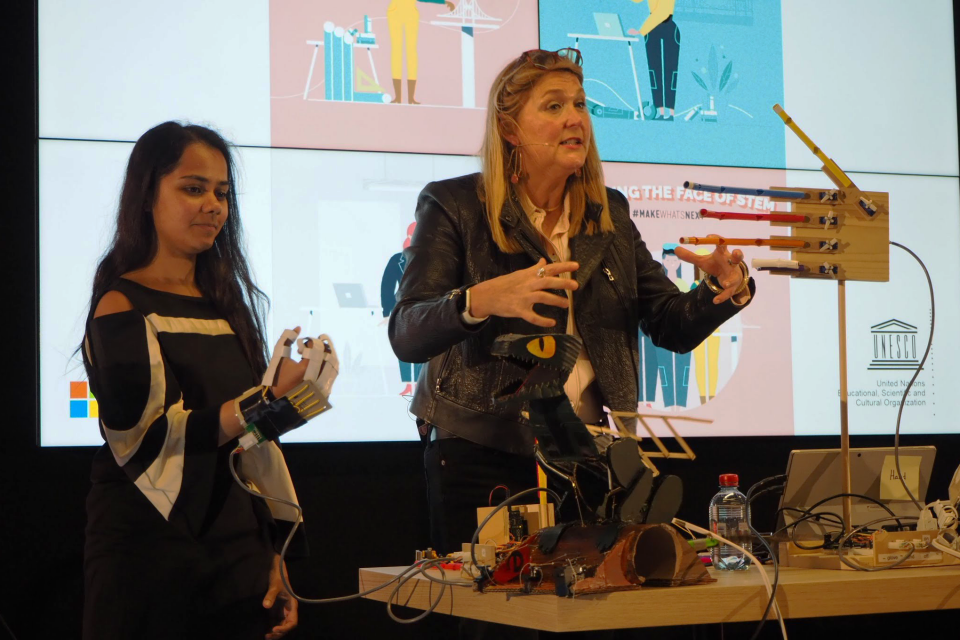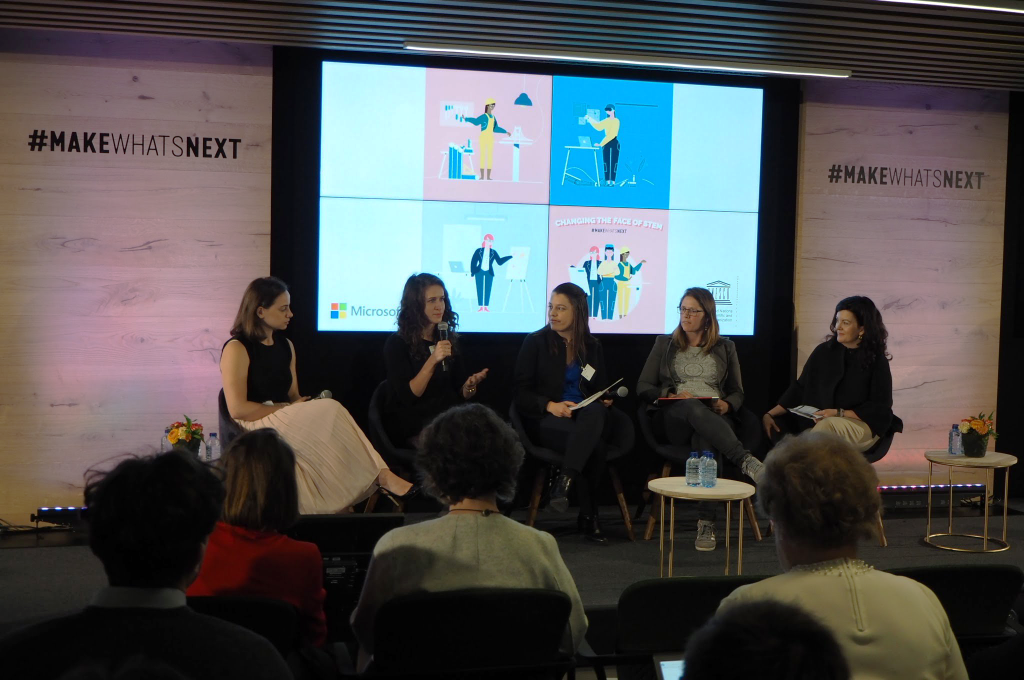By 2020, there could be a shortage of up to 500,000 digital workers, and the gender gap that still exists in the technology industry is doing nothing to help this impending shortage of digital skills.
With only one in three of the current ICT workforce being female, we still have a lot of work to do if we hope to reverse these worrying trends. If we want to increase the number of workers with digital skills, then we must reach girls and young women at a younger age, encouraging them to pursue STEM education and careers, following their passions and breaking the stereotypes.
Microsoft has conducted research which has shown that girls in Europe disengage from STEM subjects by the age of 15. Further results show that two of the most important influencing factors for engagement, are the lack of real-world applications in STEM subjects, and a shortage of positive role models, which have been shown to increase confidence and offer encouragement.
To launch its most recent findings, Microsoft, in partnership with UNESCO, brought together educators, policymakers, members of the private sector and NGOs to discuss these issues and identify solutions – including how to increase opportunities for girls and young women to meet with and be mentored by STEM role models.
Hosted at its Brussels Innovation Center, Microsoft discussed its findings in the company of similar UNESCO and Accenture reports showing why role models are critical for sustaining girls’ interest in STEM, as well as facilitating a number of sessions, panel debates and demos with influential European STEM role models.
Hosted by Laura Shields, MD of Red Thread, Former CNN and BBC Journalist, the day saw various panels address important issues, all with one aim – to change the face of STEM.
In addition to a panel discussing the research findings, another session looked at the leak in the skills pipeline, and what more could be done to alleviate it. Kyriakos Koursaris, a Microsoft Innovative Educator from Portugal, discussed his use of Minecraft as an educational tool, designed to empower and motivate students to learn.
“I have learned that classes need to be flexible, inclusive, and above all bring the best out of everyone,” Koursairs explained. “Sometimes as teachers, we need to step back a bit, and give the students control. That’s a hard part to change, involving organisational policy. What’s a bit easier to do, is to change the attitude and the way that class is given.”
Another panelist, Giustina Mizzoni, Executive Director of CoderDojo, outlined the importance of role models, stating that “You can’t be what you can’t see.” Mizzoni also stressed the important role that parents can play in encouraging their children:
“In the vast majority of CoderDojo sessions, the parents stay in the background, reading books or playing on their phones. We’re trying to work with our volunteers to engage these parents to participate, and are currently working on a toolkit to advise volunteers how to achieve this.”
Microsoft’s Karon Weber, Director of Hacking STEM, also took to the stage and showcased a variety of interactive demos, based on lesson plans available for teachers to demonstrate STEM knowledge in fun, engaging, and affordable ways.
From using Hot Wheels cars to measure the effect of mass on speed, to creating a robotic hand controlled by an attached glove – an experiment that all attendees took part in with enthusiasm – the Hacking STEM demonstration showcased just how engaging and motivational learning can be.
Microsoft Europe – changing the face of STEM
In addition to the #MakeWhatsNext even in Brussels, Microsoft has (and is) hosting a wide variety of activities across many countries in Europe, to help encourage girls and young women to embrace STEM. Below are a sample of some of the events so far:
Microsoft Netherlands
Microsoft Netherlands organised several activities to embrace girls in STEM. On April 3, it hosted a media round table about the status of Dutch girls & women in STEM education and careers together with VHTO, initiator of Girlsday, and job site Indeed. On April 12th, Girlsday 2018, it also organized a live digital talk show together with Techionista in which inspiring STEM role models were interviewed. Lastly, it also hosted ladies drinks & dialogue event on April 12.
Microsoft Cyprus
On March 26, the Centre for the Advancement of Research and Development in Educational Technology in collaboration with Microsoft Cyprus organized a whole day dedicated to programming and robotics for all girls at a rural school in Nicosia, namely, the 2nd Regional Gymnasium of Nicosia (Malounda). More than 250 girls aged 13 to 15 actively participated in hands-on workshops with the use of several technology tools. The objective of the event was to engage young girls in new technologies, boost their confidence, and positively affect them in following a related career in the future.
Microsoft Portugal
On April 26, Microsoft Portugal hosted 100 young women from the 9th grade in order to participate in Do IT, Girls, the local DigiGirlz event. This year 9th grade girls were specifically selected due to the fact that in Portugal, it is at the end of this year, that students must choose a specialized area of study. Typically, girls do not choose STEM subjects, therefore the goal of the event was to talk to the girls that will soon be making this decision, to give them a real-life perspective on what a career in technology would be like.
Microsoft Ireland
On the April 26, Microsoft Ireland hosted a #MakeWhatsNext event to mark Girls in ICT Day 2018. Up to 80 year-six students from areas surrounding One Microsoft Place and the Data Centre came together in its new innovation and education DreamSpace to learn how female peers have harnessed the transformational power of technology to become successful at a young age. By then undertaking the DreamSpace experience, the students saw first-hand how STEM skills can unlock their potential to create their own future.
Microsoft Italy
Microsoft Italy invited more than 80 students, consisting mostly of girls, to a Hackathon at its Milan-based headquarters, Microsoft House. The theme of the day was to encourage the students to think about and develop ideas designed to create a better inclusive future for the city.








